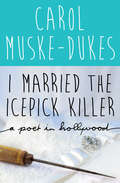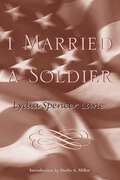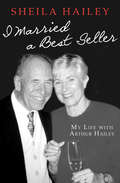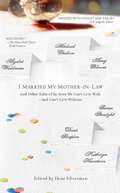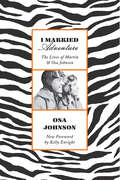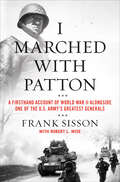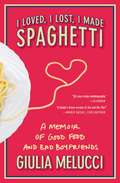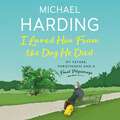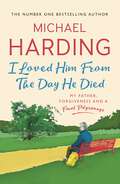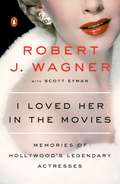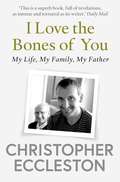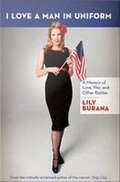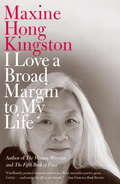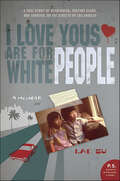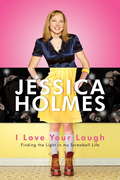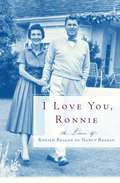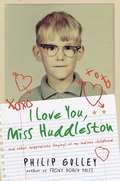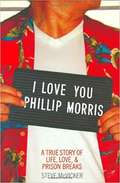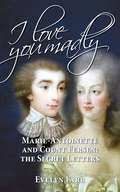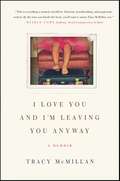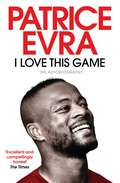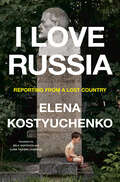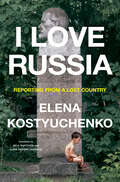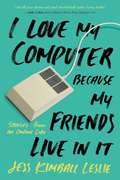- Table View
- List View
I Married the Icepick Killer: A Poet in Hollywood
by Carol Muske-DukesA vibrant and insightful essay collection about life as a poet in Southern California Poetry and Hollywood may not seem compatible in anyone&’s book. But acclaimed poet, novelist, and critic Carol Muske-Dukes finds common ground for both in meditations on movie sets and metaphors, on the big screen and the luminous focus of a haiku.I Married the Icepick Killer offers the reader ways to reimagine the Imagination itself. Former California Poet Laureate Muske-Dukes explores Southern California&’s unexpected poetry, from Emily Dickinson on freeway billboards to poet-script doctors rewriting action-flick dialogue. Moving personal essays recount the story of Muske-Dukes&’s romance with her late husband, actor David Coleman Dukes, whom she met in Italy and relocated with in Los Angeles. Muske-Dukes sharpens her astute gaze as she addresses contradictions and convergences between belle lettres and the ever-surprising City of Angels.This ebook was originally published as Married to the Icepick Killer.
I Married a Soldier
by Lydia Spencer LaneLydia Spencer Lane's account of her life as a young army bride on the early southwestern frontier is both invaluable history and delightful commentary. As an officer's wife, Lane left her home in Pennsylvania in 1854 to accompany her new husband to his first post in the West--the encampment at Fort Inge, Texas, then in the midst of a yellow-fever epidemic. For the next sixteen years, Lane crossed the Great Plains by wagon seven times, traveled nearly 8,000 miles, raised three children, and became accustomed to tours of duty that required the family to move at least every six months to a different set of military forts, frontier garrisons, and trailside bivouacs across New Mexico and Texas.First published in 1893 and unavailable for nearly a decade, Lane's narrative manifests a dry wit that lends humor to events that range from the uncomfortable to the terrifying. Through her eyes we see the close-knit social life of an army post, the western frontier's divided response to the American Civil War (including the Confederate invasion of the Mesilla Valley), and the cultures and peoples of the West. As Darlis Miller makes clear in her Introduction, Lane's courage, her sense of humor, her powers of observation, and her obvious love for the western landscape make her an unforgettable narrator, a valuable historian, and a bold exemplar of strength under pressure.
I Married a Best Seller: My Life with Arthur Hailey
by Sheila HaileyArthur Hailey&’s wife, Sheila, delivers an affectionate and deliciously candid account of her marriage to the #1-bestselling author of such popular classics as Airport and Hotel&“To stay happily married to anyone for twenty-five years is an achievement. To stay happily married for that length of time to a writer is a miracle.&”With wit and rare candor, Sheila Hailey shares the story of life with her famous husband—from the first time she heard his voice while transcribing a letter he&’d recorded on a Dictaphone and their early days scraping together pennies to go to the movies, to Arthur&’s brainstorm for his first television play, to the thrilling blockbuster success of Airport and their visits to Hollywood to see his novels made into movies.Providing insight into her husband&’s creative processes and the book publishing business, Sheila also reveals the challenges of raising a family with a workaholic husband who craved excitement. Vibrantly written, this is the love story of two strong-willed people fiercely committed to each other and the philosophy of living life to its fullest.
I Married My Mother-In-Law
by Ilena SilvermanFeaturing Michael Chabon ¥ Kathryn Harrison ¥ Matt Bai ¥ Martha McPhee ¥ Susan Straight ¥ Ayelet Waldman ¥ Colin Harrison ¥ Amy Bloom ¥ Peter Richmond ¥ Jonathan Goldstein ¥ Anthony Giardina ¥ Dani Shapiro ¥ Darcey Steinke ¥ Ta-Nehisi Coates ¥ Sarah Jenkins ¥ Barbara Jones ¥ Tom Junod In-laws are the inescapable consequence of marriage. Whether they're kind or malevolent, respectful or intrusive, they're unavoidable. The relationship can be traumatic, rewarding, maddening, and hilarious-sometimes all at once. Now, Ilena Silverman brings together a collection of talented, insightful writers who plumb their own experiences for unexpected wisdom about this prickly and often misunderstood relationship.
I Married Adventure: The Lives of Martin and Osa Johnson (Kodansha Globe Ser.)
by Osa JohnsonA CLASSIC MEMOIR OF TWO PIONEERING ADVENTURERSBefore Joy Adamson went to Africa, before Margaret Mead sailed to Samoa, before Dian Fossey was even born, a Kansas teenager named Osa Leighty married Martin Johnson, a pioneering photographer just back from a ‘round-the-world cruise with Jack London. Together the Johnsons flew and sailed to Borneo, to Kenya, and to the Congo, filming Simba and other popular nature movies with Martin behind the camera and Osa holding her rifle at the ready in case the scene’s big game star should turn hostile. This bestselling memoir retraces their careers in rich detail, with precisely observed descriptions and often heart-stopping anecdotes. Illustrated with scores of the dramatic photos that made the Johnsons famous, it’s a book sure to delight every lover of true adventure.
I Marched with Patton: A Firsthand Account of World War II Alongside One of the U.S. Army's Greatest Generals
by Robert L. Wise"Poignant. ... Well worth the read. ... A firsthand account of the turmoil and destruction in France in December 1944 and later, on the road to Germany. ... [Sisson] has an eloquence that belies the fact that he left school at 15 to support his family." — Wall Street Journal"Vivid. ... Compelling. ... Not many military veterans in 2020 can look you straight in the eye and say 'I marched with Patton'—but Frank Sisson can." — Newsmax
I Loved, I Lost, I Made Spaghetti
by Giulia MelucciFrom failure to fusilli, this deliciously hilarious read tells the story of Giulia Melucci's fizzled romances and the mouth-watering recipes she used to seduce her men, smooth over the lumps, and console herself when the relationships flamed out. From an affectionate alcoholic, to the classic New York City commitment-phobe, to a hipster aged past his sell date, and not one, but two novelists with Peter Pan complexes, Giulia has cooked for them all. She suffers each disappointment with resolute cheer (after a few tears) and a bowl of pastina (recipe included) and has lived to tell the tale so that other women may go out, hopefully with greater success, and if that's not possible, at least have something good to eat. Peppered throughout Giulia's delightful and often poignant remembrances are fond recollections of her mother's cooking, the recipes she learned from her, and many she invented on her own inspired by the men in her life. Readers will howl at Giulia's boyfriend-littered past and swoon over her irresistable culinary creations.
I Loved Him From The Day He Died: My Father, Forgiveness and a Final Pilgrimage
by Michael HardingA stunning new memoir from the number one bestselling, award-winning author of All the Things Left Unsaid and Staring at Lakes. Michael Harding was twenty three when his father died; a parent who was sometimes distant and aloof, yet had a profound effect on the writer's life. In the summer of 2023, Harding took a short holiday in Spain, walking the Camino de Santiago, during which he began to unpack the long ago trauma of losing a father he never really knew, and, in the end, finding a father he never doubted. In this new book, he examines how the parent shapes the child, and how the child, in turn, becomes a parent in the search for that which makes us whole - love. Praise for Michael Harding's writing: 'A beautiful book of great tenderness and wisdom' Joseph O'Connor 'I read this book in one sitting ... it held me and wouldn't let go' Mary McEvoy 'Wonderful' John Boyne 'Hilarious, and tender, and mad, and harrowing, and wistful, and always beautifully written' Kevin Barry 'Extraordinary' Deirdre Purcell
I Loved Him From The Day He Died: My Father, Forgiveness and a Final Pilgrimage
by Michael Harding'I wanted him to be someone he wasn't. I wanted me to be someone I wasn't.'A stunning new book from the number one bestselling, award-winning author of All the Things Left Unsaid and Staring at Lakes.To mark his 70th birthday Michael Harding travelled to Spain and walked the Camino de Santiago. Yet, as he set off on his pilgrimage, he found he wasn't alone. Accompanying him on his 126-kilometre walk in theheat of the Spanish sun was the ghost of his long-dead father, a distant and aloof figure whom he lost when he was only twenty-two years old.Here, with searing honesty and beautifully wrought prose, Harding examines how this man, who had diedalmost half a century ago, could have had such a profound effect on the writer's life.From the Ireland of his youth, to the time of his father's death, and to the holy wells and pubs he frequented in search of a connection with a man he never really knew, I Loved Him From The Day He Died is a heartfeltexamination of love, forgiveness and letting go - told with simple vulnerability and profound insight.
I Loved Her in the Movies: Memories of Hollywood's Legendary Actresses
by Scott Eyman Robert WagnerFilm and television actor and New York Times bestselling author Robert Wagner's memoir of the great women movie stars he has known. In a career that has spanned more than sixty years Robert Wagner has witnessed the twilight of the Golden Age of Hollywood and the rise of television, becoming a beloved star in both media. During that time he became acquainted, both professionally and socially, with the remarkable women who were the greatest screen personalities of their day. I Loved Her in the Movies is his intimate and revealing account of the charisma of these women on film, why they became stars, and how their specific emotional and dramatic chemistries affected the choices they made as actresses as well as the choices they made as women. Among Wagner's subjects are Joan Crawford, Bette Davis, Marilyn Monroe, Gloria Swanson, Norma Shearer, Loretta Young, Joan Blondell, Irene Dunne, Rosalind Russell, Dorothy Lamour, Debra Paget, Jean Peters, Linda Darnell, Betty Hutton, Raquel Welch, Glenn Close, and the two actresses whom he ultimately married, Natalie Wood and Jill St. John. In addition to offering perceptive commentary on these women, Wagner also examines topics such as the strange alchemy of the camera--how it can transform the attractive into the stunning, and vice versa--and how the introduction of color brought a new erotic charge to movies, one that enabled these actresses to become aggressively sexual beings in a way that that black and white films had only hinted at. Like Wagner's two previous bestsellers, I Loved Her in the Movies will be a privileged look behind the scenes at some of the most well-known women in show business as well as an insightful look at the sexual and romantic attraction that created their magic.From the Hardcover edition.
I Love the Bones of You: My Father And The Making Of Me
by Christopher EcclestonBe it as Nicky Hutchinson in Our Friends In The North, Maurice in The A Word, or his reinvention of Doctor Who, one man, in life and death, has accompanied Christopher Eccleston every step of the way – his father Ronnie. In I Love The Bones Of You, Eccleston unveils a vivid portrait of a relationship that has shaped his entire career trajectory, mirroring and defining his own highs and lows, from stage and screen triumph to breakdown, anorexia, self-doubt, and a deep belief in the basic principles of access and equality denied to generations. The actor reveals how his background in Salford, and vision of a person, like millions, denied their true potential, shaped his desire to make drama forever entwined with the marginalised, the oppressed, and the outsider.Movingly, and in scenes sadly familiar to increasing numbers, Eccleston also describes how the tightening grip of dementia on his father slowly blinded him to his son’s existence, forcing a new and final chapter in their connection, and how ‘Ronnie Ecc’ still walks alongside him today. Told with trademark honesty and openness, I Love The Bones Of You is a celebration of those on whom the spotlight so rarely shines, as told by a man who found his voice in its glare. A love letter to one man, and a paean to many. ‘My father was an “ordinary man”, which of course means he was extraordinary. I aim to capture him and his impact on my life and career.’ - Christopher Eccleston
I Love a Man in Uniform
by Lily BuranaIn this brave, eloquent, and funny memoir, critically acclaimed author Lily Burana writes about love and self-discovery with an honesty few writers would dare. A former stripper with a penchant for fishnets and anarchist politics, Lily's lacerating wit and rebellious past never would have suggested a marriage into the military. But then she met Major Mike, a Military Intelligence officer and professor at West Point, and fell hopelessly in love, resulting in a most unorthodox fairytale romance - poignant, sometimes painful, and utterly unpredictable. After Lily and Mike tied the knot, life as an Army wife proved to be a rough adjustment for authority-averse Lily. When Mike was deployed in the War on Terror, Lily was suddenly left to endure his absence alone, with no friends, no support system, and no knowledge of the vast and confusing military world into which she had married. Upon Mike's return from the war, the couple moved to historic West Point. With the support of the other military wives, Lily worked through the daily struggle to find her way and came to know and love a group of unlikely friends. Together, Mike and Lily suffered through the nightmare of Post Traumatic Stress Disorder, while Lily suffered bouts of depression that nearly ended their marriage. Through it all, Lily struggled with her preconceptions about the military and coped with being married to a good soldier fighting a brutal war.
I Love a Broad Margin to My Life
by Maxine Hong KingstonIn her singular voice--humble, elegiac, practical--Maxine Hong Kingston sets out to reflect on aging as she turns sixty-five. Kingston's swift, effortlessly flowing verse lines feel instantly natural in this fresh approach to the art of memoir, as she circles from present to past and back, from lunch with a writer friend to the funeral of a Vietnam veteran, from her long marriage ("can't divorce until we get it right. / Love, that is. Get love right") to her arrest at a peace march in Washington, where she and her "sisters" protested the Iraq war in the George W. Bush years. Kingston embraces Thoreau's notion of a "broad margin," hoping to expand her vista: "I'm standing on top of a hill; / I can see everywhichway-- / the long way that I came, and the few / places I have yet to go. Treat / my whole life as if it were a day."On her journeys as writer, peace activist, teacher, and mother, Kingston revisits her most beloved characters: she learns the final fate of her Woman Warrior, and she takes her Tripmaster Monkey, a hip Chinese American, on a journey through China, where he has never been--a trip that becomes a beautiful meditation on the country then and now, on a culture where rice farmers still work in the age-old way, even as a new era is dawning. "All over China," she writes, "and places where Chinese are, populations / are on the move, going home. That home / where Mother and Father are buried. Doors / between heaven and earth open wide."Such is the spirit of this wonderful book--a sense of doors opening wide onto an American life of great purpose and joy, and the tonic wisdom of a writer we have come to cherish.From the Hardcover edition.
I Love Yous Are for White People: A Memoir
by Lac SuAs a young child, Lac Su made a harrowing escape from the Communists in Vietnam. With a price on his father's head, Lac, with his family, was forced to immigrate in 1979 to seedy West Los Angeles where squalid living conditions and a cultural fabric that refused to thread them in effectively squashed their American Dream. Lac's search for love and acceptance amid poverty—not to mention the psychological turmoil created by a harsh and unrelenting father—turned his young life into a comedy of errors and led him to a dangerous gang experience that threatened to tear his life apart.Heart-wrenching, irreverent, and ultimately uplifting, I Love Yous Are for White People is memoir at its most affecting, depicting the struggles that countless individuals have faced in their quest to belong and that even more have endured in pursuit of a father's fleeting affection.
I Love Your Laugh
by Jessica HolmesThe three years I spent in prison taught me to hate. Fork fights and throat punches were my pastimes. But that's how it goes when you've raised yourself on spite and envy.OK, that wasn't me. Not all comedians come from a dark place. . . .In this hilarious memoir, Jessica Holmes, a fan favourite on the hit shows The Holmes Show and Royal Canadian Air Farce, offers her witty observations on everything from her eclectic upbringing by a right-wing, Mormon father and a feminist mother, to her experiences as a missionary in Venezuela, to her own trial-and-error adventures in childrearing. Delving into personal experiences never discussed before, Holmes reveals her struggle to find laughter off-stage and spins comedy gold from her fumbles. The combination makes for an inspirational, heartwarming, and thoroughly side-splitting treat.From the Hardcover edition.
I Love You, Ronnie
by Nancy ReaganNo matter what else was going on in his life or where he was--travelling to make movies for G.E., in the California governor's office, at the White House, or on Air Force One, and sometimes even from across the room--Ronald Reagan wrote letters to Nancy Reagan, to express his love, thoughts, and feelings, and to stay in touch. Through letters and reflections, the characters, personalities, and private lives of a president and his first lady are revealed. Nancy Reagan comments on the letters and writes with love and insight about her husband and the many phases of their life together.
I Love You, Miss Huddleston
by Philip GulleyWith his ear for the small town and his knack for finding the needle of humor in life's haystack, Philip Gulley might well be Indiana's answer to Missouri's Mark Twain. In I Love You, Miss Huddleston we are transported to 1970's Danville, Indiana, the everyone-knows-your-business town where Gulley still lives today, to witness the uproarious story of Gulley's young life, including his infatuation with his comely sixth-grade teacher, his dalliance with sin--eating meat on Friday and inappropriate activities with a mannequin named Ginger--and his checkered start with organized religion. Sister Mary John had shown us a flannelgraph of the apostles receiving the Holy Spirit on the day of Pentecost. They looked quite happy, except that their hair was on fire. . . . I was suspicious of a religion whose highpoint was the igniting of one's head, and my enthusiasm for church, which had never been great, began to fade. Even as Kennedy was facing down Khrushchev, Danny Millardo and his band of youthful thugs conducted a reign of terror still unmatched in the annals of Indiana history. With Gulley's sharp wit and keen observation, I Love You, Miss Huddleston captures these dramas and more, revisiting a childhood of unrelieved and happy chaos. From beginning to end, Gulley recalls the hilarity (and heightened dangers) of those wonder years and the easy charm of midwestern life.
I Love You Phillip Morris: A True Story Of Life, Love, And Prison Breaks
by Steve McVickerTo escape from a Texas jail or prison once is unusual. To do it four times is incredible. To do it four times in five years and always on a Friday the 13th is the stuff of legend. Welcome to the world of Steven Russell. Con artist. Thief. Swindler. Embezzler. Hopeless romantic. A husband and father, Russell was a church organist, prosperous businessman, and onetime Boca Raton cop before turning to his life of crime. Arrested for a string of felonies, with a specialty in fraud, his real expertise turned out to be his uncanny ability to escape from jail. Between 1993 and 1998, he orchestrated a string of prison breaks that were as audacious as they were ingenious. Using whatever unlikely materials were at handa Magic Marker, a pay phone, a walkie-talkie, a pair of stolen bright red women's stretch pantsalong with an innate talent for analytical thinking and boundless quantities of sheer nerve, Russell again and again arranged his own "early releases" from jail. Unfortunately, for Russell, staying out of jail is another matter entirely. Over the years, it became increasingly clear that Russell's talent for escape is matched only by his knack for getting arrested. One thing always seems to trump Steven Russell's careful planning, cool head, and instinct for self-preservationlove. Russell cannot resist the urge to try and spring the great love of his lifea fellow inmate named Phillip Morris. In I Love You Phillip Morris, journalist Steve McVicker goes right to the heart of this improbable-but-true story of crime, punishment, and passion. Thanks to unprecedented and exclusive access to Russell, his family, and his friends, he retraces Russell's journey from small-town businessman to flamboyant white-collar criminal and jailhouse Houdini. It's the darkly comic tale of a man with a spectacular ability to manipulate almost everyone he meets, yet who is himself helpless in the face of love.
I Love You Madly: The Secret Letters
by Evelyn FarrDelve deeper into the world of the BBC hit drama series Versailles, and discover the real Marie-Antoinette in this ground-breaking study of her secret love affair with the Swedish diplomat Count Axel von Fersen. For the first time an historian has compiled all the known letters between Swedish count Axel von Fersen and Marie-Antoinette, including six letters never before published. With unprecedented access to French and Swedish archives, Evelyn Farr has proven beyond doubt one of history's greatest romances. Axel von Fersen was Queen Marie-Antoinette's lover and loyal counsellor who gave her political advice from 1785 to the fall of the French monarchy at the time of the French Revolution. He organized the Royal Family's escape from Paris in 1791. Evelyn Farr's revelatory work on the subject also goes some way to proving that Count Fersen was in fact the biological father of Marie Antoinette's two younger children. Farr unveils the logistics and practicalities behind the romance; the use of code and invisible ink, the role of intermediaries, secret seals, double envelopes, codenames and the location of Fersen's clandestine lodgings at Versailles. I Love You Madly is a meticulously researched and enjoyable study of a forbidden love at a time of revolution. The letters portray a rebellious and independent queen who risked everything and broke all the rules to love the man who succeeded in conquering her heart.
I Love You And I'm Leaving You Anyway: A Memoir
by Tracy McMillanTelevision writer Tracy McMillan’s comic literary road trip into the heart and soul of her relationship with her father—a convicted pimp, drug dealer, and felon—and what it has meant for her relationships with men. Like a cross between The Glass Castle and Hypocrite in a Poufy White Dress, I Love You and I’m Leaving You Anyway is funny, inspiring, and truly unique.
I Love This Game: The Autobiography
by Patrice Evra'Excellent and compellingly honest' Alyson Rudd, The Times In I Love This Game, the long-awaited autobiography of Patrice Evra, the former Manchester United and France star looks back on a remarkable life and career. Having played alongside some of the club's greatest legends, such as Ryan Giggs, Cristiano Ronaldo, Wayne Rooney and Paul Scholes, in one of United's most successful eras, Evra has now found a new role as an in-demand pundit and social media star. But, as he reveals in this frank, often shocking, but always compelling memoir, beneath the surface things were not so simple, and he had to fight all the way to get to the top. Initially, it was football that saved him from being sucked into the gang culture of his tough neighbourhood of Les Ulis in the suburbs of Paris. Then, once he achieved his dream of becoming a professional, he had to deal with racism and a notorious dispute with Luis Suarez; he also became a central figure in the infamous &‘strike&’ by the France national team in the 2010 World Cup; and there was the moment he launched an attack against a Marseille fan while warming up. &‘I Love This Game&’ has become Evra&’s catchphrase. Throughout this wonderful book, his passion for his sport shines through and there are revealing and entertaining behind-the-scenes insights about the players and managers he&’s worked with, from Sir Alex Ferguson to Paul Pogba, who knows him as Uncle Pat. With infectious enthusiasm and sharp observation, Evra takes the reader where few football autobiographies dare to tread.
I Love Russia: Reporting from a Lost Country
by Elena Kostyuchenko"Elena Kostyuchenko is an important guide to the 21st century." —Timothy Snyder, author of The Road to Unfreedom"A fascinating, frightening, compulsively readable chronicle of life in Putin's Russia.... Her stories are unforgettable, and deeply important.&” ― Carol Off, author of All We Leave Behind &“Would you like to know where Putin comes from? What the Russians are like today? And why? Read this book." ― Svetlana Alexievich, winner of the Nobel Prize in LiteratureTo be a journalist is to tell the truth.I Love Russia is Elena Kostyuchenko's fearless attempt to document Putin's Russia as experienced by those it systematically and brutally erases: village girls recruited into sex work, queer people in the outer provinces; patients and doctors in a Ukrainian maternity ward; and reporters like herself, at risk not only because of her work but because she lived openly as a queer woman and LGBTQ activist in a deeply homophobic state. It takes us to places that non-Russians have never seen and brings us voices we have never heard.At once uncompromising and deeply humane, her book stitches together reportage and personal essays into a kaleidoscopic, often otherworldly journey. Here is Russia as it is, not as we imagine it.I Love Russia may be the last work from her homeland Kostyuchenko will publish for a long time—perhaps ever. She writes as she does, because she is driven by the conviction that the greatest form of love and patriotism is criticism. And because the threat of Putin's Russia extends beyond herself, beyond Crimea and beyond Ukraine.
I Love Russia: Reporting from a Lost Country
by Elena Kostyuchenko* Named a Best Book of the Year by The New Yorker and TIME * Winner of the Pushkin House Book Prize * A New York Times Book Review Editors' Choice *&“A haunting book of rare courage.&” —Clarissa Ward, CNN chief international correspondent and author of On All Fronts To be a journalist is to tell the truth. I Love Russia is Elena Kostyuchenko&’s unrelenting attempt to document her country as experienced by those whom it systematically and brutally erases: village girls recruited into sex work, queer people in the outer provinces, patients and doctors at a Ukrainian maternity ward, and reporters like herself. Here is Russia as it is, not as we imagine it. The result is a singular portrait of a nation, and of a young woman who refuses to be silenced. In March 2022, as a correspondent for Russia&’s last free press, Novaya Gazeta, Kostyuchenko crossed the border into Ukraine to cover the war. It was her mission to ensure that Russians witnessed the horrors Putin was committing in their name. She filed her pieces knowing that should she return home, she would likely be prosecuted and sentenced to up to fifteen years in prison. Yet, driven by the conviction that the greatest form of love and patriotism is criticism, she continues to write. I Love Russia stitches together reportage from the past fifteen years with personal essays, assembling a kaleidoscopic narrative that Kostyuchenko understands may be the last work from her homeland that she&’ll publish for a long time—perhaps ever. It exposes the inner workings of an entire nation as it descends into fascism and, inevitably, war. She writes because the threat of Putin&’s Russia extends beyond herself, beyond Crimea, and beyond Ukraine. We fail to understand it at our own peril.
I Love My Computer Because My Friends Live in It: Stories from an Online Life
by Jess Kimball LeslieI Love My Computer Because My Friends Live in It is tech analyst Jess Kimball Leslie's hilarious, frank homage to the technology that contributed so significantly to the person she is today. From accounts of the lawless chat rooms of early AOL to the perpetual high school reunions that are modern-day Facebook and Instagram, her essays paint a clear picture: That all of us have a much more twisted, meaningful, emotional relationship with the online world than we realize or let on. Coming of age in suburban Connecticut in the late '80s and early '90s, Jess looked to the nascent Internet to find the tribes she couldn't find IRL: fellow Bette Midler fans; women who seemed impossibly sure of their sexuality; people who worked with computers every day as part of their actual jobs without being ridiculed as nerds. It's in large part because of her embrace of an online life that Jess is where she is now, happily married, with a wife, son, and dog, and making a living of analyzing Internet trends and forecasting the future of tech. She bets most people would credit technology for many of their successes, too, if they could only shed the notion that it's as a mind-numbing drug on which we're all overdosing.
I Love My Bike
by Brittain Sullivan Matthew FinkleCycling is about joy. Sure, it takes willpower, strength, and grit, but at its core, being on a bike is all about rejoicing in the greatest transportational invention in history. I Love My Bike is a photographic celebration of the grand kinship of bicycles, a bond shared by millions of people around the world. This distinctive and affordable coffee table book for cyclists collects the best of the stories, photographs, and bicycles encountered by the authors during numerous cross-country photo-journaling trips. Readers will meet longtime messengers and hardcore roadies, casual commuters and weekend day-trippers, tattoo artists and skateboarders, bike builders and first-time owners—all of them in love with their two-wheeled contraptions. With gorgeous full-color photos on every spread, I Love My Bike delivers the trifecta of awesome for any cyclist: cool people, cool photos, and really, really cool bikes.
